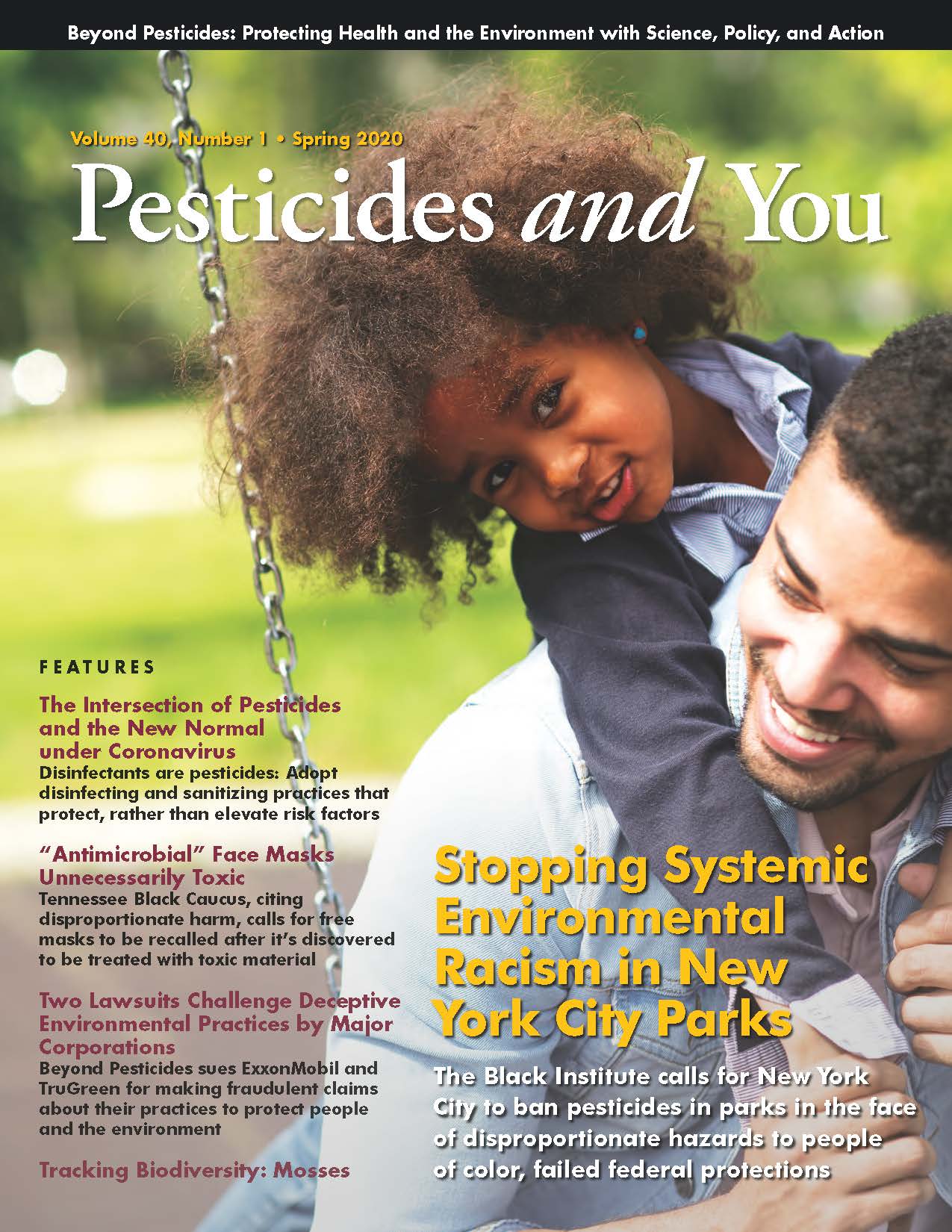22
Jul
Safer Disinfectants for Coronavirus Response and Reversing Racial Disparities in Managing Public Parks—Topics included in Beyond Pesticides Journal, Pesticides and You
 (Beyond Pesticides, June 22, 2020) In the latest issue of Pesticides and You, the quarterly journal of Beyond Pesticides, articles focus on the key issues of the day—a safe response to novel coronavirus (Covid-19) without toxic disinfectants, and confronting environmental racism in communities with campaigns to take toxic pesticides out of public parks.
(Beyond Pesticides, June 22, 2020) In the latest issue of Pesticides and You, the quarterly journal of Beyond Pesticides, articles focus on the key issues of the day—a safe response to novel coronavirus (Covid-19) without toxic disinfectants, and confronting environmental racism in communities with campaigns to take toxic pesticides out of public parks.
A Critical Moment in History
In introducing the issue, Beyond Pesticides executive director, Jay Feldman, writes: “Nurturing and sustaining life is at the core of the environmental work going on in communities across the country. However, as the events of the past months have illustrated, if we are to ensure that our society and planet are sustainable, it will require the protection of those facing the greatest hazards and attention to the underlying disparities behind them.”
“Stopping Systemic Environmental Racism in New York City Parks”
Lead article, “Stopping Systemic Environmental Racism in New York City Parks,” focuses on the report, Poison Parks, written by The Black Institute in January, documents New York City public spaces in low-income people of color neighborhoods being sprayed with the weed killer glyphosate (Roundup) at significantly higher rates than other parts of the city. The report notes, “Minority and low-income communities suffer from the use of this chemical [glyphosate] and have become victims of environmental racism.” The Black Institute points out that those working in the parks are disproportionately people of color, with 96% building services employees and 56% of laborers being people of color. While the percentages vary, this is generally the case nationwide, in our experience.
At a press conference in front of City Hall in New York City in January, The Black Institute, flanked by Council Members Ben Kallos and Carlina Rivera, Beyond Pesticides, and others, called for the passage of legislation to take toxic pesticides out of public parks. They spoke to the disproportionate harm from pesticide exposure to people of color using the New York City parks.
“The Intersection of Pesticides and the New Normal under Coronavirus”
As people settle in to protect themselves long-term from coronavirus, in addition to common sense prevention (masks and distancing), this article focuses on safer disinfection products that do not increase people’s vulnerability to this deadly illness. The authors point out that, “In the management of viral and bacterial infections, it is always important that we do not exacerbate the risk to individuals in the process of avoiding or controlling the threat. It is important to avoid products that increase vulnerability to respiratory problems or weaken the immune system. In the case of Covid-19, there are protective measures—both practices and products—that can protect us without using toxic products that increase risk factors.” The Beyond Pesticides website offers a guide to buying disinfectants and sanitizers, regularly updated as EPA allows more toxic disinfectants on to the market. (See www.bp-dc.org/disinfectants.)
“Antimicrobial” Face Mask Unnecessarily Toxic”
As the public buys and uses face masks to prevent exposure to Covid-19, there are numerous masks being sold or given away with toxic materials incorporated in the fabric. These chemicals offer no additional protection from the virus, but, in fact, introduce an unnecessary hazard to users. In the article, Beyond Pesticides warns people to avoid any fabric or clothing that markets “extra protection” in the form of a patented antimicrobial. These fabrics introduce a risk and have not been evaluated by EPA or FDA for use as a face mask when the toxic ingredients can be dislodged from the cloth material.
“Two Lawsuits Challenge Deceptive Environmental Practices by Major Corporations”
Earlier this year, Beyond Pesticides sued TruGreen and ExxonMobil in separate lawsuits for making fraudulent claims about their practices to protect people and the environment. The article notes that in both cases, Beyond Pesticides charges that the companies are engaging in fraudulent and misleading practices that misstate the truth and the facts, leading the public to believe that they are offering solutions that people want to support with their purchasing power. The article states: “TruGreen, a nationwide chemical-intensive lawn treatment company, has long characterized its practices as good for the environment and healthy for those who purchase their toxic pesticide service. ExxonMobil, as a oil and gas producer of petrochemicals that are the basis for pesticides, has invested significant advertising dollars to tell the public that they are a green company, heavily invested in addressing and solving the climate crisis.”
The issue includes a continuation of its series, Tracking Biodiversity, with a review of mosses. As the article states, “Mosses are a fascinating and beautiful part of local ecosystems, filling an important niche, and serving as habitat for literally thousands of microscopic organisms that work in concert with nature. And they are evergreen, providing green cover all winter!” The journal issue contains a review of Sicker, Poorer and Fatter: The urgent threat of hormone-disrupting chemicals on our health and future. . .and what we can do about it by Leonardo Trasande, M.D. of New York University Medical School.
You can view Beyond Pesticides Pesticides and You archives on the organization’s website.










